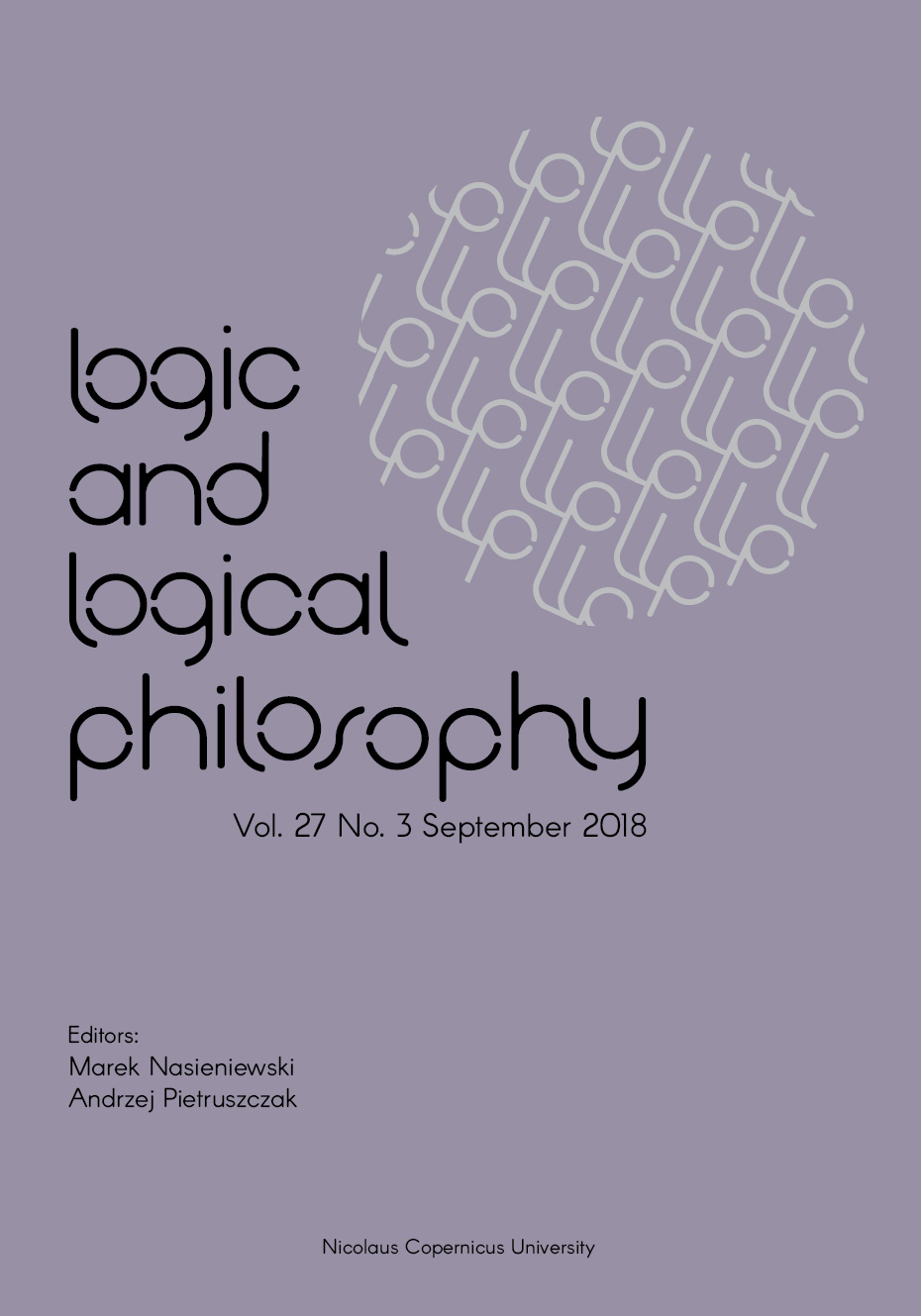Epistemic Erotetic Search Scenarios
DOI:
https://doi.org/10.12775/LLP.2018.010Keywords
questions, Inferential Erotetic Logic (IEL), Dynamic Epistemic Logic (DEL), e-scenarios, agendaAbstract
The aim of this paper is to introduce erotetic search scenarios known from Inferential Erotetic Logic by using the framework of epistemic erotetic logic. The key notions used in this system are those of askability and epistemic erotetic implication. Scenarios are supposed to represent all rational strategies of an agent solving the problem posed by the initial question where the interaction with an external information source is seen as a series of updates of the agent’s knowledge.
References
Genot, E.J., “Extensive questions”, pages 131–145 in R. Ramanujam and S. Sarukkai (eds.), Logic and Its Applications, Lecture Notes in Computer Science, vol. 5378, Springer, Berlin, Heidelberg, 2009. DOI: http://dx.doi.org/10.1007/978-3-540-92701-3_9
Ginzburg, J., The Interactive Stance: Meaning for Conversation, Oxford University Press Oxford, 2012. DOI: http://dx.doi.org/10.1093/acprof:oso/9780199697922.001.0001
Groenendijk, J., and M. Stokhof, “Questions”, pages 1055–1125 in J. van Benthem and A. ter Meulen (eds.), Handbook of Logic and Language, Elsevier, 1997. DOI: http://dx.doi.org/10.1016/B978-044481714-3/50024-2
Groenendijk, J., and F. Roelofsen, “Compliance”, pages 161–173 in A. Lecomte and S. Tronçon, editors, Ludics, Dialogue and Interaction, Lecture Notes in Computer Science, vol. 6505, Springer, Berlinm Heidelberg, 2011. DOI: http://dx.doi.org/10.1007/978-3-642-19211-1_10
Leszczyńska-Jasion, D., and P. Łupkowski, “Erotetic search scenarios and three-valued logic”, Journal of Logic, Language and Information 25, 1 (2016): 51–76. DOI: http://dx.doi.org/10.1007/s10849-015-9233-4
Łupkowski, P., Test Turinga. Perspektywa sędziego, “Umysł. Prace z filozofii i kognitywistyki”, Wydawnictwo Naukowe UAM, Poznań, 2010.
Łupkowski, P., “A formal approach to exploring the interrogator’sperspective in the Turing test”, Logic and Logical Philosophy, 20, 1/2 (2011):139–158. DOI: http://dx.doi.org/10.12775/LLP.2011.007
Łupkowski, P., Logic of Questions in the Wild. Inferential Erotetic Logic in Information Seeking Dialogue Modelling, College Publications, London, 2016.
Łupkowski, P., and D. Leszczyńska-Jasion, “Generating cooperative question-responses by means of erotetic search scenarios”, Logic and Logical Philosophy 24, 1 (2015): 61–78. DOI: http://dx.doi.org/10.12775/LLP.2014.017
Łupkowski, P., and A. Wiśniewski, “Turing interrogative games”, Minds and Machines 21, 3 (2011): 435–448. DOI: http://dx.doi.org/10.1007/s11023-011-9245-z
Olsson, E.J., and D. Westlund, “On the role of the research agenda in epistemic change”, Erkenntnis, 65, 2 (2006): 165–183. DOI: http://dx.doi.org/10.1007/s10670-006-9001-6
Peliš, M., Inferences with Ignorance: Logics of Questions (Inferential Erotetic Logic & Erotetic Epistemic Logic), Karolinum, Praha, 2016.
Peliš, M., and O. Majer, “Logic of questions and public announcements”, pages 145–157 in N. Bezhanishvili, S. Löbner, K. Schwabe and L. Spada (eds.), Logic, Language, and Computation, Lecture Notes in Computer Science, vol. 6618, Springer, 2011. DOI: http://dx.doi.org/10.1007/978-3-642-22303-7
Urbański, M., “Synthetic tableaux and erotetic search scenarios: Extension and extraction”, Logique et Analyse 173–174–175 (2001): 69–91.
Urbański, M., and P. Łupkowski, “Erotetic search scenarios: Revealing interrogator’s hidden agenda”, pages 67–74 in P. Łupkowski and M. Purver (eds.), Aspects of Semantics and Pragmatics of Dialogue. SemDial 2010, 14th Workshop on the Semantics and Pragmatics of Dialogue, Polish Society for Cognitive Science, Poznań, 2010.
Urbański, M., K. Paluszkiewicz and J. Urbańska, “Erotetic problem solving: From real data to formal models. An analysis of solutions to erotetic reasoning test task”, pages 33–46 in F. Paglieri, L. Bonetti and S. Felletti (eds.), The Psychology of Argument: Cognitive Approaches to Argumentation and Persuasion, College Publications, London, 2016.
van Ditmarsch, H., W. van der Hoek and B. Kooi, Dynamic Epistemic Logic, Springer, 2008. DOI: http://dx.doi.org/10.1007/978-1-4020-5839-4
Wiśniewski, A., The Posing of Questions: Logical Foundations of Erotetic Inferences, Kluwer AP, Dordrecht, Boston, London, 1995.
Wiśniewski, A., “Questions and inferences”, Logique et Analyse, 173–175 (2001): 5–43.
Wiśniewski, A., “Erotetic search scenarios”, Synthese 134, 3 (2003): 389–427. DOI: http://dx.doi.org/10.1023/A:1022983325118
Wiśniewski, A., Essays in Logical Philosophy, LIT Verlag, Berlin, Münster, Wien, Zürich, London, 2013.
Wiśniewski, A., Questions, Inferences and Scenarios, volume 46 of Studies in Logic. Logic and Cognitive Systems, College Publications, 2013.
Wiśniewski, A., “Answering by means of questions in view of Inferential Erotetic Logic”, pages 261–283 in J. Meheus, E. Weber and D. Wouters (eds.), Logic, Reasoning and Rationality, Springer, 2014. DOI: http://dx.doi.org/10.1007/978-94-017-9011-6_14
Downloads
Published
How to Cite
Issue
Section
Stats
Number of views and downloads: 773
Number of citations: 1







